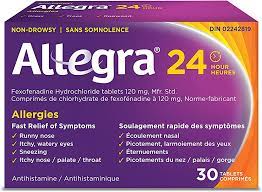Allegra, also called fexofenadine, is an antihistamine that reduces the effect of histamine in the body. Histamine regulates some physiological and pathophysiological processes in the body, such as inflammation, watery eyes, itchy nose and eyes, hives, running nose, sneezing, etc. These are usually allergic reactions to unwanted substances in your body, and this drug can reduce or eliminate them.
This medication can also be used for other purposes as prescribed by your healthcare provider. The common brand names for the drug are Allegra, Allergy Relief, Allegra Allergy 24 Hour, Allegra Allergy 12 Hour, and Allegra Children’s Allergy.
Dosage
This drug should be taken by mouth with a full glass of water, but follow the directions for use on its prescription label or follow your doctor’s prescription. You can take the drug with or without food but do not take it more than as directed. You have to be patient enough because it may take several days for your symptoms to improve, so do not increase your dosage without consulting your doctor.
Side Effects of Allegra
Some side effects of Allegra that require immediate medical attention are as follows:
- Difficulty breathing.
- Trouble swallowing.
- Hives.
- Swelling of your throat, face, tongue, or lips.
- Fever, body aches, cough, chills, etc.
- skin rash
Less serious side effects may include:
- Headache, nausea, upset stomach or diarrhoea
- Drowsiness or fatigue.
- Dry mouth.
- Menstrual cramps.
- cough
- Muscle or back pain.
Precautions
If you are allergic to this medication or have a history of kidney problems, tell your healthcare provider before taking the drug. Also, do not take it with any fruit juice.
Tell your doctor if you are on other medication, if you are pregnant or breastfeeding, and if your symptoms become worse or do not improve after using this medication. Lastly, do not use more than the recommended dose.



